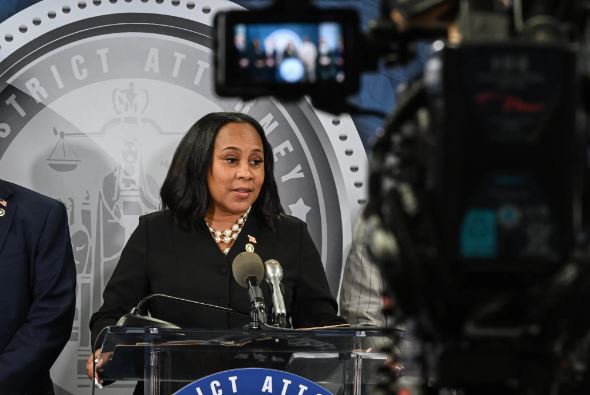Fani T. Willis, the district attorney in Atlanta overseeing an election interference case against former President Donald J. Trump and 14 of his associates, stated on Tuesday that a trial would likely extend “not until the winter or the very early part of 2025.”
She also defended the scope of the racketeering indictment she filed in August, emphasizing her extensive experience with larger racketeering cases throughout her career. Willis charged Trump and 18 others with participating in a criminal enterprise aimed at altering the outcome of the 2020 presidential election. Four defendants have already agreed to plea deals and are cooperating with prosecutors.
While the trial date for the remaining defendants is uncertain, speculation suggests that the district attorney may seek a summer start. Willis’s comments were made at a women’s conference held by The Washington Post, coinciding with her office’s effort to secure an emergency protective order preventing the release of discovery materials in the Georgia case. Videos of private testimonies from defendants who entered plea agreements were leaked on Monday.
One video, featuring Jenna Ellis, a former Trump campaign lawyer who pleaded guilty last month, revealed that she was informed in December 2020 that Trump was unwilling to leave. Another video from Kenneth Chesebro, a lawyer who worked with the Trump campaign, disclosed that he met with the president in mid-December 2020 and discussed a memo he drafted stating that January 6, 2021, was the “real deadline for settling a state’s electoral votes.” This memo preceded the Trump administration’s deployment of fake electoral voters to pressure Vice President Mike Pence not to certify the election results on January 6.
Addressing the leaked videos, Willis expressed disappointment but emphasized their significance in building the case against higher-profile defendants. She stated that the district attorney’s office always aims to reach the top of the ladder, potentially alluding to Trump.
Steve Sadow, Trump’s lead lawyer in Georgia, dismissed the video contents, emphasizing that Trump left the White House on January 20, 2021. A spokesman for Rudolph W. Giuliani, another defendant, criticized Willis’s suggestion of a trial extending into 2025, labeling it part of a broader attempt to prevent Trump’s potential return to the White House in 2024.
Willis revealed that she had anticipated threats when initiating the investigation, but the level of racism in the threats surprised her. She reported receiving over 100 threats, many of which were racist, noting that she has been called the N-word numerous times in the last three years. Despite the challenges, she affirmed her commitment to continuing her work.
Concerning potential contact with Jack Smith, the special prosecutor appointed by the Justice Department leading two other criminal cases against Trump, Willis declined to comment. She asserted that despite being portrayed as partisan, she considers herself a law-and-order district attorney.
As her office faces challenges securing the trial’s integrity and managing leaked materials, the case against Trump and his associates continues to unfold with potential implications for the political landscape.

